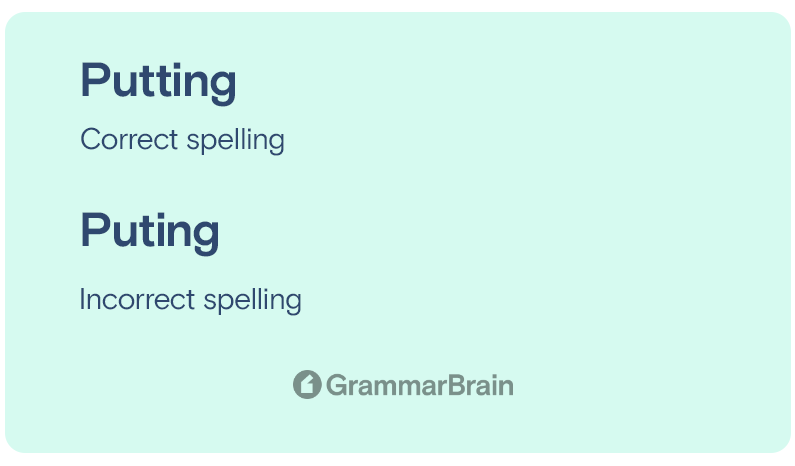Is it puting a book on the table or is it putting a book on the table? Puting and Putting are often confused with each other but puting is actually a misspelling of putting and thus, should not get used.
It is a very common mistake made by not only non-native English speakers but also native English speakers. The reason for this is because English can be a confusing language. The rules for turning a verb into its continuous (-ing) form is not always consistent. There are exceptions.

Difference Between Put and Putt (puting and putting)
To understand how putting is used we must first learn the difference between put and putt. Put means to move to or place in a particular position while putt refers to a gentle stroke that hits a golf ball across the green towards the hole.
They pronunciation differs as well. Put is pronounced as pʊt whereas putt is pronounced as pʌt.
Examples of sentences using put and putt:
- I put the bag on the table
- He put a knife on the counter
- There is also an eighteen-hole pitch and putt golf course
- He pitched out and eventually saved par with about a 4-foot putt
Putting: pʊtɪŋ or pʌtɪŋ
It is important to note that PUTTING is a homograph. Homographs are words which have one spelling but two pronunciations and two different meanings and/or usages.
In English, the rule for adding -ing (continuous tense) to a verb is that if this verb comprises of consonant + vowel + consonant, then the last consonant should be doubled. According to this rule, the “t” in “Put” should be doubled, and the only correct spelling is “Putting”.
Now, Putting aka pʊtɪŋ means to put or move an object somewhere but Putting aka pʌtɪŋ is the continuous tense of the word putt.
Examples of putting in sentences
pʊtɪŋ
- Mother was putting plates on the table when the school bus dropped Stella off.
- Mary is putting us all at risk.
- She didn’t like putting her expensive China in the dishwasher.
- I’m all for putting the opponent team down.
- Now her husband was putting was a damper on everyone’s mood with his self-centered and arrogant remarks.
- I had barely finished putting the things away when Jacob knocked on the kitchen door.
- My husband was putting the groceries away when the doorbell rang.
pʌtɪŋ
- Ronald’s putting let him down today; he was unable to sink a single putt over three feet.
- Jacob’s putting is so good that nobody can beat him.
- Putting is a technique that not all can master.
- Father has been teaching my brother putting for a week now.
- Shayna learned putting in less than a month.
- Bobby Jones mastered golf long before The Masters came to be. His putting skills were insane.
- My husband’s putting game is on point.
Conclusion
Puting is not a word that exists in English. It is the misspelling of the word Putting. So, whether you are talking about placing or moving something OR you are talking about golf, always use putting and never puting.
Sources
- Puting or Putting – Which Spelling Is Correct? (grammarhow.com)
- Puting vs. Putting – Which is Correct? – School & Travel (schoolandtravel.com)
- Puting vs Putting – What’s the difference? | WikiDiff
- PUTTING | English meaning – Cambridge Dictionary
- 251 Synonyms & Antonyms of PUTTING | Merriam-Webster Thesaurus
Inside this article
Fact checked:
Content is rigorously reviewed by a team of qualified and experienced fact checkers. Fact checkers review articles for factual accuracy, relevance, and timeliness. Learn more.
Core lessons
Glossary
- Abstract Noun
- Accusative Case
- Anecdote
- Antonym
- Active Sentence
- Adverb
- Adjective
- Allegory
- Alliteration
- Adjective Clause
- Adjective Phrase
- Ampersand
- Anastrophe
- Adverbial Clause
- Appositive Phrase
- Clause
- Compound Adjective
- Complex Sentence
- Compound Words
- Compound Predicate
- Common Noun
- Comparative Adjective
- Comparative and Superlative
- Compound Noun
- Compound Subject
- Compound Sentence
- Copular Verb
- Collective Noun
- Colloquialism
- Conciseness
- Consonance
- Conditional
- Concrete Noun
- Conjunction
- Conjugation
- Conditional Sentence
- Comma Splice
- Correlative Conjunction
- Coordinating Conjunction
- Coordinate Adjective
- Cumulative Adjective
- Dative Case
- Determiner
- Declarative Sentence
- Declarative Statement
- Direct Object Pronoun
- Direct Object
- Diction
- Diphthong
- Dangling Modifier
- Demonstrative Pronoun
- Demonstrative Adjective
- Direct Characterization
- Definite Article
- Doublespeak
- False Dilemma Fallacy
- Future Perfect Progressive
- Future Simple
- Future Perfect Continuous
- Future Perfect
- First Conditional
- Irregular Adjective
- Irregular Verb
- Imperative Sentence
- Indefinite Article
- Intransitive Verb
- Introductory Phrase
- Indefinite Pronoun
- Indirect Characterization
- Interrogative Sentence
- Intensive Pronoun
- Inanimate Object
- Indefinite Tense
- Infinitive Phrase
- Interjection
- Intensifier
- Infinitive
- Indicative Mood
- Participle
- Parallelism
- Prepositional Phrase
- Past Simple Tense
- Past Continuous Tense
- Past Perfect Tense
- Past Progressive Tense
- Present Simple Tense
- Present Perfect Tense
- Personal Pronoun
- Personification
- Persuasive Writing
- Parallel Structure
- Phrasal Verb
- Predicate Adjective
- Predicate Nominative
- Phonetic Language
- Plural Noun
- Punctuation
- Punctuation Marks
- Preposition
- Preposition of Place
- Parts of Speech
- Possessive Adjective
- Possessive Determiner
- Possessive Case
- Possessive Noun
- Proper Adjective
- Proper Noun
- Present Participle
- Prefix
- Predicate



